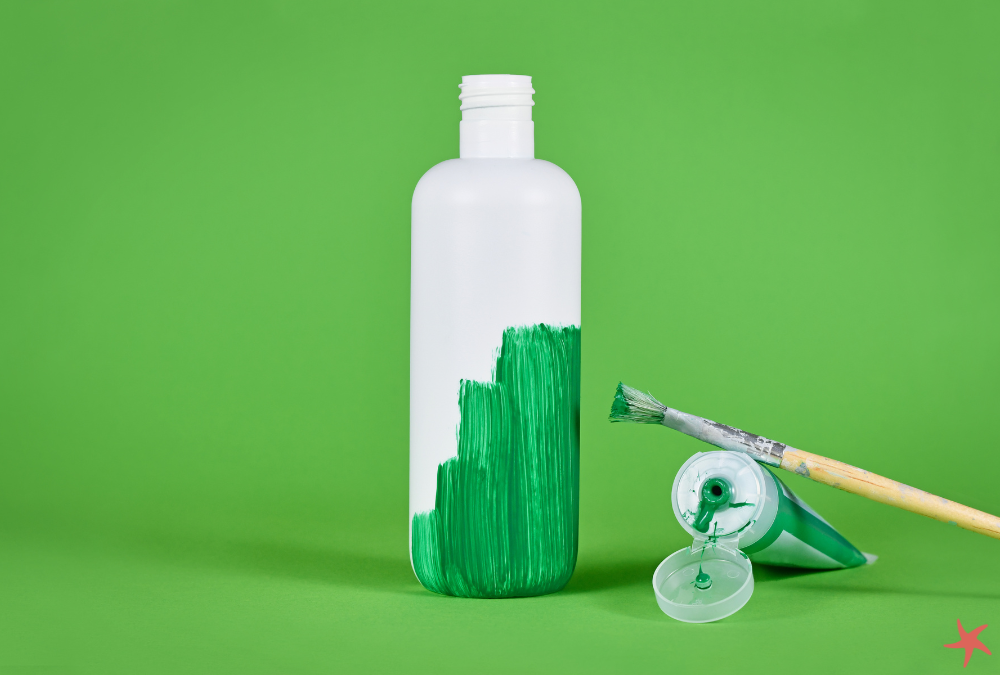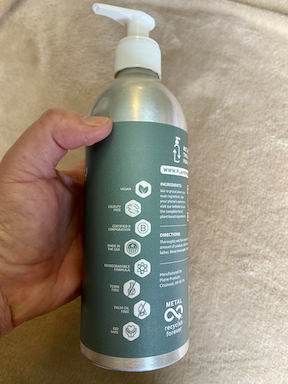“Every time you spend money, you’re casting a vote for the kind of world you want.” (Anna Lappe)
What are Greenwashing & Goodwashing?
Greenwashing is when companies claim to care about their impacts on the environment by promoting their efforts as being more sustainable than they really are. These claims range from a bit of exaggeration to blatant lies.
Goodwashing is very similar to greenwashing. It happens when companies claim to care about people, communities, and stakeholders— again, inflating, exaggerating, or even entirely fabricating the positive impacts of their actions.
We’ve all likely seen products labeled as “eco-friendly” (usually with green or blue fonts and images of nature scenes). We might be less likely to notice greenwashing & goodwashing when companies engage in other actions intended to mislead stakeholders regarding their environmental (greenwashing) and social (goodwashing) performance and benefits, while they continue with business as usual. Common tactics include: lack of certifications, fake endorsements, deceptive imagery, exaggerated claims, and hidden partnerships and investments.
The two easiest approaches I’ve found to avoiding greenwashing & goodwashing are:
- Shop local and as close to the source as possible, buying from farmers, producers, makers, craftspeople— supporting small businesses in the community. (Or better yet, when possible, consider borrowing, bartering, or buying used; we’ll discuss those options in more detail in future posts.)
- Choose products and services from companies that are Certified B Corporations
Why? Certified B Corporations meet the highest verified standards of social and environmental performance, transparency, and accountability. The Certification process uses credible, comprehensive, transparent, and independent standards of social and environmental performance. It’s a super rigorous process: hundreds of thousands of companies have completed the B Impact Assessment, but only 6,320 (as of January 2023) have scored high enough and jumped through all of the hoops to become Certified B Corporations. Look for this logo:
Are there companies other than those that are Certified B Corporations who truly walk their talk around issues related to social impact, sustainable/resilient/regenerative economies, CSR/ESG, JEDI, stakeholder/rights-holder capitalism, etc.? Absolutely! It’s just more difficult to evaluate and ascertain the validity of their claims.
Examples of companies telling stories vs those who authentically walk their talk:
Lip Balm: Burts Bees vs The Body Shop, Beauty Counter, or Eco Lips
Say you’re looking for some lip balm. You consider this plastic tube of yummy smelling beeswax mixed with other moistening goodness from Burt’s Bees, taking a moment to notice the rabbit with stars “no animal testing” logo and the ubiquitous and misleading “recyclable plastic” sign. Maybe you even surf over to the Burt’s Bees website and read that they feature “ingredients from nature” and “responsible sourcing” (without any data or information to back up those claims). You look for the B Corporation logo and don’t see one (because they’re not a Certified B Corp).
Then you head over to The Body Shop, Beautycounter, or Eco Lips and you read about their lip care products— all of which are made with certified organic ingredients and certified fair trade sources, by people earning living wages. Because all three brands are Certified B Corporations that truly walk their talk around sustainability and social impact. They’re among the now 50+ members of the newly formed B Corp Beauty Coalition, which includes Plaine Products, a hair and skin care company started by sisters, Lindsey and Ali, and University of Florida Grads (Alison) who dreamt of a world with less plastic waste.
In short:
The quick and easy answer to avoiding greenwashing & goodwashing is to be conscientious consumers by buying from well-known and trusted local sources, and/or by choosing products and services from Certified B Corporations.
Resources for more info:
- How to Avoid Greenwashing – Network for Business Sustainability
- How Can Business Combat Greenwashing? – B Lab Forces for Good Podcast
- What is greenwashing—and how do you avoid it? – National Geographic
- A Guide to Greenwashing and How to Spot It – EcoWatch
- How to tell credible eco-labels from “greenwash” – Corporate Knights
- Greenwashing.com
If you’d like to read more about how to avoid greenwashing & goodwashing, the complete version of this post is here.
If you’d like to sign up for “(How to) Do Good Well,” a monthly email newsletter with tips & tools for how we (as business & community leaders, consumers, citizens, and changemakers) can all leverage the power of business (and our resources — of our time, talent, energy, attention, capital, and connections) as a force for good… creating strategic impact to benefit people, the planet, and prosperity… simply enter your email address here: https://dogoodwell.substack.com/subscribe.
This was a guest post by Dr. Kristin Joys, an impact strategist with over 25 years of experience educating & empowering changemakers. In addition to her day job as the founder & director of the Social Impact & Sustainability Initiative in the Entrepreneurship & Innovation Center at the University of Florida, she is founder of do good well consulting, a certified B Corporation. Kristin also serves as Chair of Teaching & Curriculum Innovation for B Academics and Director of Strategic Impact & Senior Advisor for Academic Partners for Florida for Good.Each spring she directs the UF Business for Good Lab: Social Impact & Sustainability Consulting program where teams of students work as consultants, helping companies to walk their talk around sustainability, track their progress towards the UN SDGs, and apply to become certified B Corporations.




